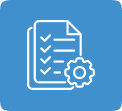
Electronic medical records (EMR) systems rapidly transformed with better accuracy, interoperability, and accessibility of healthcare and patient information at the point of care. With digitization, user expectations continue to evolve parallelly with advancements in data analytics, communication and collaboration tools, telemedicine, and a host of hospital and healthcare management systems.
This year, the global EMR market is predicted to hit $40.32 billion at a compound annual growth rate (CAGR) of 5.2%. In 2025, several industry-leading EMR software are set to embrace integrations with advanced technologies like AI, predictive analytics, voice recognition systems, and more.
Please read the blog to understand the role of EMR software in the healthcare ecosystem and the impact of its customization in serving the unique objectives of hospitals and healthcare systems.
Importance of EMR for Hospitals and Healthcare Providers
EMR systems were created to maintain an electronic record of clinical and laboratory procedures, physician and healthcare provider treatments, nursing and diagnostics information, and pharmacy and hospital billing information. Data stored in EMR systems facilitate the delivery of healthcare services by authorized users, healthcare professionals, and non-clinical staff. It also enables users to input, store, and manage health-related information per compliance standards and supports telemedicine and e-health systems with quality data.
Several hospitals and healthcare providers are guilty of using archaic technologies to store and access confidential patient and healthcare information. Unsupported legacy operating systems are a reality of 73% of healthcare organizations in the U.S. Annually, the federal government shells out $337 million to maintain and modernize legacy systems! Modernizing legacy EMR systems is needed in the healthcare industry to bridge digital barriers to accessing healthcare information.
Here are the Disadvantages of Legacy EMR System
Workflow and Administrative Inefficiencies
Most legacy EMR solutions lack compatibility and integration with recent digital systems. Legacy software is built on outdated computing systems or hardware. They may be off the market and can no longer access developer skills for updates or support. These factors often create data barriers and silos, causing delays and convoluted workflows, ultimately leading to administrative challenges, burnouts, and costs.
Lack of Customization:
The ‘one-size-fits-all’ philosophy of off-the-shelf EMRs makes them less desirable for customers in the healthcare industry seeking specialized features, user interfaces, dashboards, and data formats that suit their workflow and best practices. It is impossible to force-fit a healthcare organization’s entire process per the specifications of an EMR software designed for the mass market that rarely meets its users’ performance, safety, cost, and compliance expectations. Moreover, vendor lock-ins with legacy off-the-shelf EMRs make new systems migration or modernization complicated, time-consuming, and expensive.
Scalability Challenges:
Most legacy EMR systems are not built to handle dynamic business changes, unanticipated patient volumes, the addition of new departments, or the integration of new systems or services. Their limited scalability would require a patchwork of third-party systems and additional investment in hardware and infrastructure, leading to operational lags, slower turnarounds, and potential system failures.
Data Privacy and Security Risks:
Legacy software systems are the initial points of compromise in 15% of security incidents in healthcare organizations. Healthcare systems are soft targets for cybersecurity and data privacy breaches. Most legacy solutions lack the configurations to support recent data privacy and security requirements. They are less likely to support the evolving data privacy regulations and compliance standards such as HIPAA. The absence of custom data privacy and cybersecurity features designed exclusively for organizations and the type of risks and vulnerability pose a significant challenge. It makes healthcare firms susceptible to phishing, ransomware, malware attacks, data breaches, and other sophisticated forms of threats.
Importance of Customizing Healthcare EMR Software
Custom EMR systems guarantee tremendous benefits for healthcare providers. It helps overcome common usability challenges like navigation, user interface, performance, data formats, data sharing and management, security and confidentiality features, etc. Let us unpack the merits and importance of custom EMR software for healthcare facilities and hospitals.

Tailored for Unique Requirements
Developers customize EMR systems’ interfaces and workflows to ease usability, navigation, and accessibility challenges and tailor the solution to healthcare practices. Customization resolves problems of standard templates, and rigid and repetitive administrative workflows. It helps replace manual tasks like data entry with automation, custom chooses templates for documentation and data storage, and auto-insert intuitive features like voice prompts, fields, and transcription to enhance user-friendliness and efficiency.

Streamlined Operations and Administrative Workflows
With customization, EMR users achieve the ideal level of user-friendliness and eliminate common administrative and operational barriers like data duplication, errors, inaccuracies, and repetitive tasks like patient scheduling, data entry, claims processing, and more. This improves efficiency, prompt collaboration, and communication between stakeholders, which is necessary for powering healthcare decisions in real-time.

Improved Patient Care
Custom EMR software ensures better accessibility to patients’ medical and healthcare information, history, diagnostics data, and other data, which helps clinicians and medical staff proactively act and deliver personalized care and treatment plans. Higher quality of care results in better patient outcomes and satisfaction levels.

Future-Proofing the System
It is nearly impractical to predict future trends and trajectories. Hospitals and healthcare systems thrive on the agility, flexibility, and scalability benefits of healthcare EMRs. Custom EMR software can seamlessly accommodate changes and growth in healthcare practices, resources, staffing and patient volumes, departments and teams, and new locations and service expansions. Customization also helps EMR software readily adapt to changing compliance standards, regulations, technology, and cybersecurity requirements.

Cost Optimization
Customization efforts on EMR systems may require additional investments. However, in the long run, they guarantee cost savings. Traditional EMR software systems may have a one-time upfront cost but require frequent upgrades or replacements. Custom EMRs can be tailored to sustain long-term plans and requirements, allowing better cost savings.
Six Ways Custom EMR Software is a Game-changer
If you have decided to choose custom EMR software over a conventional pre-built solution, consider the strategic areas that can be personalized to address unique healthcare practice requirements. Let us explore the laundry list of changes your healthcare organization can benefit from customizing EMR software.
User-Friendly Interface
The user adoption rate is valuable for gauging the direct impact and value of your EMR software investments. Enhancing user-friendliness with intuitive dashboards, robust features, and easy integrations with diverse healthcare systems can lower the learning curve and training time. User-friendly features and design also help streamline clinical and healthcare workflows and processes.
Regulatory Compliance and Data Security
Eliminate all possible cybersecurity and data privacy loopholes with multi-factor authentication, encryption, and strong adherence to patient data protection standards for HIPAA compliance.
Interoperability and Seamless Data Exchange
Integration with existing systems and solutions used across the care continuum promises the organizational and workflow agility needed to make informed healthcare and clinical decisions. Strong integration and cross-system collaboration also ensure seamless and secure data exchange across departments and stakeholders to power clinical and care decisions.
AI-Powered Analytics and Insights
Stay ahead of the curve by leveraging the latest advancements in technologies like AI, which offer predictive insights and real-time clinical decision support. Hospital communication tools can also explore the GenAI leg-up with intuitive and contextually accurate chatbot agents to offer prompts and suggestions, resolve repetitive queries, and cater to inbound requests. AI-powered analytics and natural language processing (NLP) help map and respond to behaviors and patient-provider interactions while providing insights to enhance care quality and patient experience.
Enhanced Patient Engagement Tools
Replace archaic methods of manually engaging with patients with custom AI-enhanced patient portals. These portals help automate repetitive processes like appointment scheduling, billing, claims, and processing. By analyzing patient records and data from telemedicine and digital healthcare systems, hospitals can explore new ways of engaging with patients by offering remote care and monitoring services.
Repetitive Task Automation
We already know the benefits of AI and robotic process automation (RPA) in streamlining operational and administrative tasks. Replacing the time-consuming and manual-led processes for scheduling, documentation, and patient communication with automation frees up time for clinical and non-staff to focus on high-value tasks.
Let us discuss the benefits of switching from a legacy EMR to custom EMR software that resonates with your healthcare organization’s clinical practices.
Advantages of Upgrading to Custom EMR Software

Increased Efficiency
Customization by specialists in the field can be a one-time thing or a need-based requirement. Upgrading from a legacy pre-built EMR to custom EMR software would make the system palatable to workflows and clinical best practices while saving time and cost of upgrades, maintenance, and replacements. Custom EMR software attuned to a healthcare organization’s needs will have less scope for reducing errors and wastages.

Future-Proofing Your Healthcare Facility
In the changing world of healthcare tech, custom EMR software addresses long-term interoperability and data access requirements. EMR /EHR customization is more than adding a few features and dashboards. It involves dedicated efforts to make the software fit the flow of practices, processes, specializations, and regulatory needs in the long run. Customization also helps accommodate dynamic requirements without needing new system migrations.

Compliance with Evolving Healthcare Standards
Hospitals are at risk of data breaches and facing legal complications, lawsuits, and penalties for compliance violations. Implementing custom EMR software tailored to adapt and fulfill requirements under the evolving regulatory climate guarantees ongoing compliance and protection against breaches that damage reputation.

Better Patient Outcomes
Customizing EMR software increases data accessibility, transparency, and collaboration. In turn, it empowers doctors, nurses, and other medical staff to make informed healthcare decisions, leading to better patient outcomes.
Conclusion
Replacing legacy and outdated healthcare tech and IT systems with advanced software is commonplace in the industry. In 2024, the National Institute of Health (NIH) announced its decision to upgrade its aging EHR system with a new software version with AI enhancements. Smaller and medium-sized healthcare organizations can take inspiration from the nation’s largest hospital to leap into a new custom EMR software with a dedicated full-cycle development team and experts.
Qualified and experienced IT professionals with deep industry knowledge understand that no two healthcare organizations are alike. Their insights will help plan the customization journey, considering your organization’s intrinsic needs and mapping them with data migration, systems integration, charting, reporting and documentation, monitoring, and other requirements.
Partnering with a well-known IT staffing partner guarantees smooth planning and execution of EMR customization without downtime and failure risks. Your healthcare firm can focus on patient care delivery and quality while we assemble the right experts to optimize your investments in custom EMR and EHR systems.
Are you looking to hire experienced EMR software developers or customization experts?
Contact our team today!







